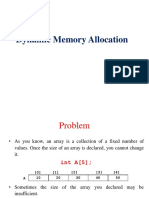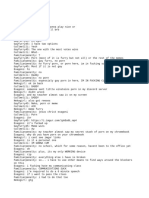0% found this document useful (0 votes)
28 views17 pagesDynamic Memory Allocation
Dynamic memory allocation in C uses pointers to allocate and free memory from the heap at runtime. The malloc() function allocates memory on the heap and returns a pointer to that memory. This allows arrays and structures to be created with sizes determined at runtime. The free() function deallocates or frees the memory previously allocated by malloc to avoid memory leaks. Examples demonstrate using malloc() to allocate memory for integer arrays and linked lists, and free() to release the memory.
Uploaded by
rohitggothiCopyright
© © All Rights Reserved
We take content rights seriously. If you suspect this is your content, claim it here.
Available Formats
Download as PDF, TXT or read online on Scribd
0% found this document useful (0 votes)
28 views17 pagesDynamic Memory Allocation
Dynamic memory allocation in C uses pointers to allocate and free memory from the heap at runtime. The malloc() function allocates memory on the heap and returns a pointer to that memory. This allows arrays and structures to be created with sizes determined at runtime. The free() function deallocates or frees the memory previously allocated by malloc to avoid memory leaks. Examples demonstrate using malloc() to allocate memory for integer arrays and linked lists, and free() to release the memory.
Uploaded by
rohitggothiCopyright
© © All Rights Reserved
We take content rights seriously. If you suspect this is your content, claim it here.
Available Formats
Download as PDF, TXT or read online on Scribd
/ 17























































































